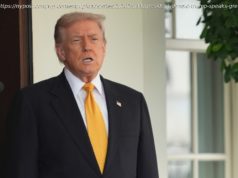Finding Comey’s replacement, continuing fallout from Don Jr.’s email reveal, Brazil’s convicted president, and more
Comey’s Replacement: At his confirmation hearing today, Christopher Wray, President Trump’s nominee for FBI director, assured the Senate Judiciary Committee that he’ d maintain his independence from the administration. Wray is a former federal prosecutor and served as the head of the Justice Department’s Criminal Division. If confirmed, he’ ll take on the FBI’s portion of the investigation into Russian interference in the presidential election, though he mostly avoided specific answers on the ongoing probe.
Speaking of Russia: The fallout continues over Donald Trump Jr.’s release of the email chain documenting his plans to meet with a lawyer as “ part of Russia and its government’s support for Mr. Trump.” That lawyer was Natalia Veselnitskaya, a corporate attorney whose precise relationship with the Kremlin is complicated. Though Trump Jr.’s defenders have claimed that the meeting was routine, the revelations about it point to the unorthodox methods that governed his campaign—and may now be undermining his presidency .
Around the World: Brazil’s former president, Luiz Inácio Lula da Silva, will serve nine and a half years in prison over his involvement in the Petrobras corruption scandal. In the U. K., a member of Parliament has been suspended because of her use of a racial slur while discussing Brexit at a public event. And China is opening its first overseas military base in Djibouti, where the largest permanent U. S. base in Africa is also located.
Nelba Márquez-Greene, whose daughter was killed in the Sandy Hook shooting, responds to the political strategist Roger Stone’s attack on the parents of a murdered DNC staffer.
Melissa Harris-Perry, a politics professor and commentator, and her former student Mankaprr Conteh discuss Harris-Perry’s approach to mentorship —which she learned from her own mentor, Maya Angelou.
Anthony Ruffin, a caseworker in Los Angeles, explains why housing helps to cut the heavy public health-care costs of homelessness, and how he’s working to find shelter for the city’s most vulnerable people. Watch the short documentary here.
Sam Lubell on the New York Zoological Society’s Department of Tropical Research, which worked to identify new species from 1916 to 1964:
Working alongside these researchers was [the scientist William] Beebe’s team of artists, who created incredible pencil, ink, and watercolor renderings of the specimens that were later introduced to a rapt public. In the absence of suitable photographic technologies, painters and illustrators had long accompanied scientific teams on their missions. The difference with the DTR was that its leader, Beebe—a bestselling author and star in his own right who was a good friend of well-known performers, politicians, and tycoons—wanted his work to reach beyond the academy. It helped that his team was unveiling organisms, particularly those in the deep seas, that had never before been seen by man.
Read more, and see some of those images, here .
1. Construction of the Erie Canal began in the year ____________.
Scroll down for the answer, or find it here .
2. Ellie Arroway, the protagonist of the 1985 sci-fi novel Contact, is based on the real-life astronomer ____________, who pioneered the search for extraterrestrial life.
Scroll down for the answer, or find it here .
3. Adults begin to become less effective after about ____________ minutes of paying attention.
Scroll down for the answer, or find it here .
Answers: 1817, Jill Tarter, 20
The writer and philosopher Henry David Thoreau was born 200 years ago today. In our August 1862 issue, The Atlantic ’s co-founder Ralph Waldo Emerson remembered him thus:
His poetry might be bad or good; he no doubt wanted a lyric facility and technical skill; but he had the source of poetry in his spiritual perception. He was a good reader and critic, and his judgment on poetry was to the ground of it. He could not be deceived as to the presence or absence of the poetic element in any composition, and his thirst for this made him negligent and perhaps scornful of superficial graces.… He was so enamored of the spiritual beauty that he held all actual written poems in very light esteem in the comparison.…
Such was the wealth of his truth that it was not worth his while to use words in vain.… His biography is in his verses. His habitual thought makes all his poetry a hymn to the Cause of causes, the Spirit which vivifies and controls his own.
Read more here, and check out some of Thoreau’s contributions to The Atlantic here .
A reader whose marriage ultimately ended over the stress of fertility issues responds to our series of personal stories about infertility:
I was born with a unicornuate uterus. I have half a uterus, one Fallopian tube, and two ovaries. I had to go through an MRI to see if I had the other half of my uterus “floating” around somewhere. I do not.
Our chance of conceiving naturally dropped drastically after this discovery. Our doctor hinted that IVF would be best because of my condition (I cannot carry twins, and this way they can monitor how many eggs they put in) . But my husband decided he didn’ t want to pay for IVF. He wanted to go the route of what insurance would cover: just insemination (which can result in multiple eggs being fertilized) .
Our marriage took a turn for the worse after our first attempt at insemination failed. He never once attended an appointment with me. And it was very hard to see that someone who said they understood and would do anything to have a baby with me not did want to pay for IVF.
More reader stories here. As Sarah Elizabeth Richards writes today, some fertility doctors have begun to use a method that significantly lowers the cost of IVF treatments by allowing a woman to incubate embryos inside a device inserted in her vagina. The device also has the potential to resolve some of the objections made by the Catholic church to traditional IVF treatments.
If you’ ve struggled with infertility, has cost or faith been a factor in your decisions about whether to seek treatment? Write us a note— hello@theatlantic.






